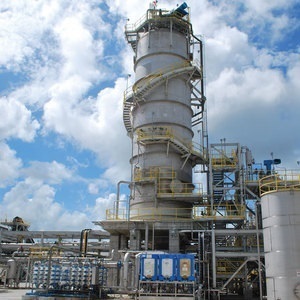Florida cellulosic ethanol plant upgraded, coming back online

Susanne Retka Schill
September 17, 2014
BY Holly Jessen
The Indian River BioEnergy Center, a cellulosic ethanol production center near Vero Beach, Florida, has completed a major turnaround, including technology upgrades, and the facility is now being brought back online, Ineos Bio said in a press release.
“We will soon finish installation of equipment that will be used to remove impurities from one of our process streams that have been negatively impacting operations,” said Nigel Falcon, site director. “This equipment will be commissioned and brought online over the remainder of the year.”
Advertisement
A nine-page Florida Department of Environmental Protection, Division of Air Resource Management document published online reveals that the company had produced little to no ethanol due to production of low levels of hydrogen cyanide (HCN), which is toxic to the bio-organisms in the fermentation process. The company received preliminary approval from the state environmental protection department to install wet scrubbers to remove HCN to levels of less than 5 ppm at full gasification rates.
An Ineos Bio spokesperson said the document was not supposed to be released by the state due to business confidentially reasons. Requests to the state environmental protection department for additional information were not returned.
The facility, which can produce of 8 MMgy of cellulosic ethanol and produce 6 megawatts of renewable power at full capacity, came online last fall. It’s a joint venture commercial demonstration project between Ineos Bio and New Planet Energy. The facility will produce cellulosic ethanol from multiple waste streams, primarily yard waste, but also municipal solid waste, biomass, vegetative matter, land clearing debris and untreated wood collected by the waste disposal district.
Advertisement
The company has now spent a year investigating the issue and testing options for improving operations, Falcon said in the press release. It is now in the final stages of implementing its plan to upgrade the facility over the next six months. “We fully expected to encounter new challenges as we scaled up this exciting new technology,” he said. “We’ve taken the time to develop solutions that will enable reliable production of high quality bioethanol. The efforts moving forward will continue to focus on safe operations, optimizing the technology, and de-bottlenecking the plant to achieve full production capacity.”
Related Stories
Greenergy, a leading European producer of biodiesel from waste, announces a 10-year extension to its lease with the Port of Amsterdam, reinforcing its long-term commitment to biofuel production in the Netherlands.
SAF Magazine and the Commercial Aviation Alternative Fuels Initiative announced the addition of new speakers to the 2025 North American SAF Conference & Expo, taking place Sept. 22–24 at the Minneapolis Convention Center in Minneapolis.
The U.S. EPA on Aug. issued decisions on 175 small refinery exemption (SRE) petitions, granting full or partial exemptions of Renewable Fuel Standard blending obligations for 143 petitions. According to the EPA, 13 SRE petitions remain pending.
The U.S. EPA on Aug. 21 released data showing more than 1.92 billion RINs were generated under the Renewable Fuel Standard in July, down from 2.26 billion generated during the same month of last year.
STX Group, a leading environmental commodities trader and climate solutions firm, on Aug. 13 announced the completion of the first successful delivery of sustainable aviation fuel certificates (SAFc).
Upcoming Events










